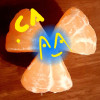Gravity field scaling?
(To be clear, I’m more interested in the reach and scaling of gravity.)
If we were to suddenly double earth’s mass, but not it’s size, would it’s field double in size (I assume strength as well), to the extent that if I were to measure this increased gravity at the same place I measured earth’s normal gravity, it would simply be double? If so, the least measurable point of both gravitates should also be the same?
Just wondering if there’s diminishing returns or if mass and density affects a gravity field the same regardless of whether it’s an asteroid or a billion Solar Masses.
Feel free to share any views I’m not taking into account in regards to gravity fields.
Thanks

Add comment